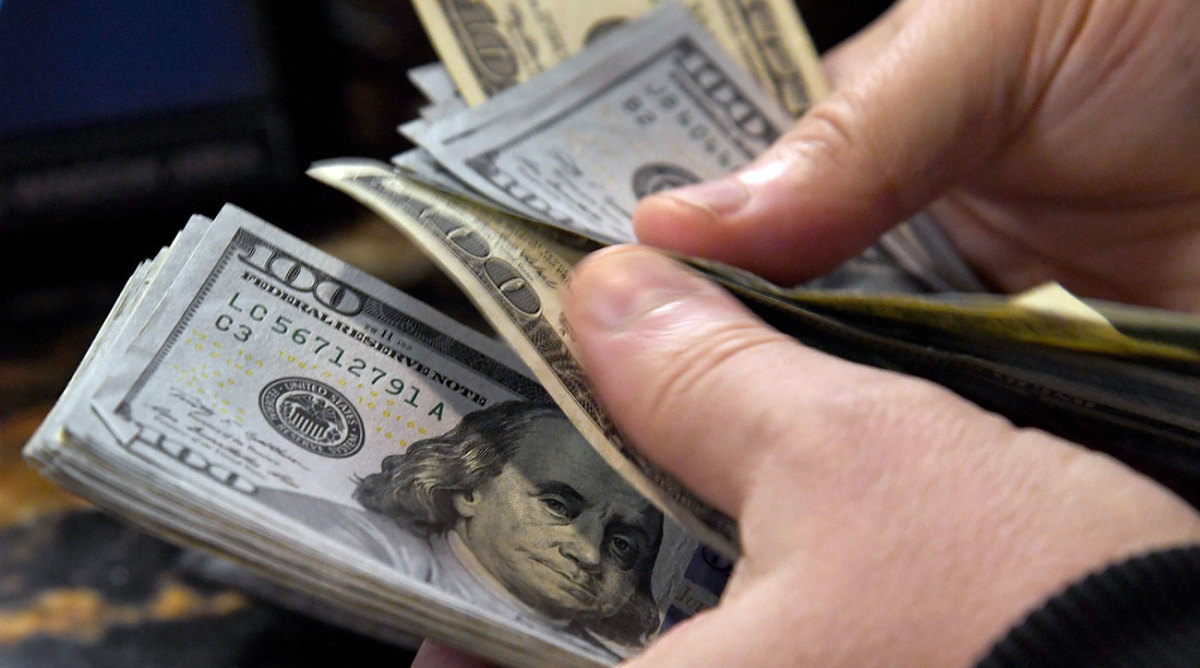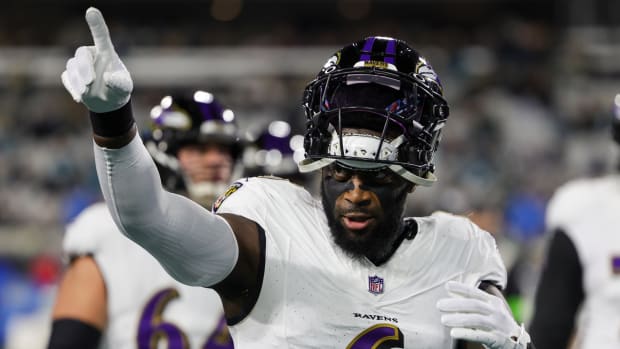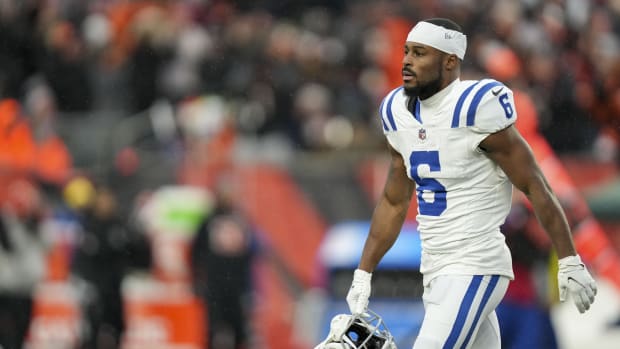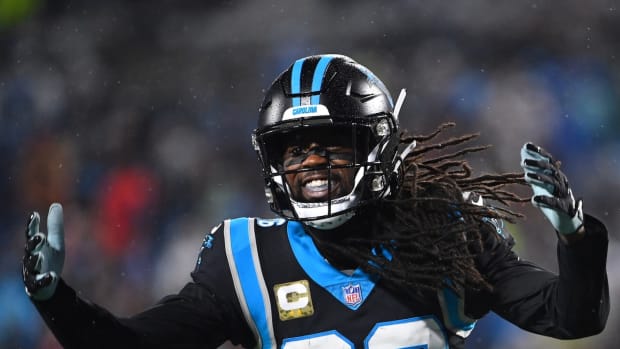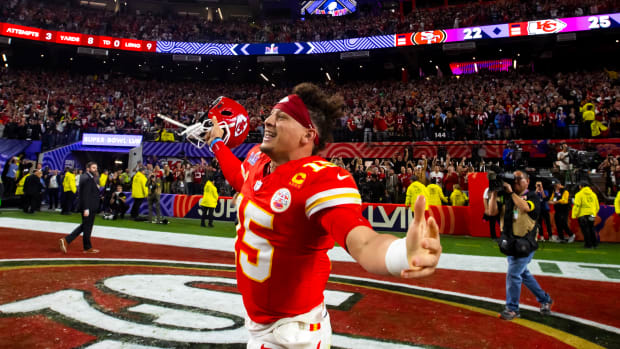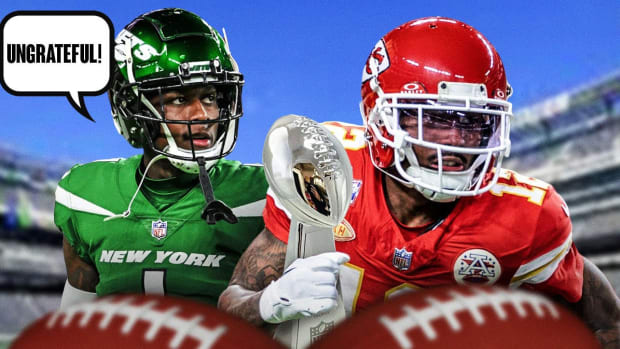Like Most Sports Controversies, the Supreme Court Gambling Case Is About Money and Control
WASHINGTON, D.C. — In the off moments when they weren’t shooting the King’s soldiers, dumping crates of tea into harbors and otherwise committing treason, the Founding Fathers were quite the bunch of gambling men. They all bet the ponies. (In The Daily Beast, author and historian Philip Smucker wrote about a horse race in which an entry owned by George Washington beat one owned by Thomas Jefferson.) They bet on cards and they bet on anything that moved, including fighting cocks, an extraordinarily grubby and bloody exercise that the landed gentry did not speak of among themselves, except when divvying up the evening’s process.
It didn’t always work out well for them. James Madison’s stepson, John Payne Todd, gambled away not only his fortune, but his indulgent stepdad’s as well. Madison wound up having to mortgage the family estate to pay off his stepson’s debts. The Continental Army was kept afloat partly by a series of national lotteries. It is an essential part of the American character to make someone else’s money your money with as little physical labor as possible. So, when Washington superlawyer Ted Olson began his presentation before the Supreme Court of the United States by taking us all back to the fights over federal and state sovereignty, it was hard not to imagine the spirits of the Founders, laying odds on whether the state of New Jersey or the NCAA would win the case.
The matter of Christie v. NCAA came before the Court as the first order of business Monday morning. At issue was the state of New Jersey’s desire to legalize betting on sports events. In 1992, at the behest of almost every important sports organization in the country, Congress passed something called the Professional and Amateur Sports Protection Act. PASPA—Washington travels on its anagrams—left sports betting intact where it already existed but forbade it everywhere else. It did, however, leave a window of time within which New Jersey could join the other states, but New Jersey blew that deadline.
Nevertheless, the state has gone to war against PASPA since 2012, when a statewide referendum on sports betting passed overwhelmingly. All the leagues, and the busybodies at the NCAA, sued the state and won. New Jersey tried again in 2014, and got beat in court again. The state then appealed that verdict to the Supreme Court, which shocked everyone by taking the case.
The U.S. Supreme Court Is Set to Decide on Sports Gambling. Is the NFL Ready for the Result?
The legislative history of PASPA is an interesting one. Its passage 20 years ago was suffused with the kind of public moralism that has been used to cloak all manner of greed and stupidity on the part of sports management at every level, but most notably, among the panjandrums of college sports who, as always, were concerned only about the delicate souls of their “student-athletes,” and not concerned at all about someone besides themselves making money off the sweat of same. But they weren’t alone. In the congressional hearings, then-NBA commissioner David Stern told Congress that it had the power and the duty to regulate sports betting, and the law’s advocates in Congress weren’t shy about taking their consciences out for a walk, either. After a hearing on the law, one congressional subcommittee intoned, “Sports gambling is a national problem. The harms it inflicts are felt beyond the borders of those States that sanction it.” There is no indication in the historical record that the members of that subcommittee then ascended to heaven in golden chariots.
But times change, and sanctimony very often becomes unaffordable. Particularly in the wake of the economic crash of 2008-2009, states became cash-strapped and went trolling desperately for new sources of revenue. David Stern completely reversed himself. The successful Republican candidate for president in 2016 came out in favor of sports betting. As a longtime leader in this area, New Jersey jumped at the opportunity. Still clinging to its tattered reputation, the NCAA issued a statement that read, in part, and probably the funniest part, “The N.C.A.A. maintains that the spread of legalized sports wagering is a threat to the integrity of athletic competition and student-athlete well-being.” With the NCAA, comedy remains king. This time, however, the public morals argument found substantial pushback, up to and including the nine wise souls on the bench in Washington. Because, in those chambers, the real fight over sports betting was joined, and the real fight is not about sinful wagering, or even specifically about money. It is about control.
Every major sports controversy of the past 50 years is about control. The endless wrangles about free agency have been about control. The civic brawls over subsidized stadia have been about control. The current, Hydra-headed crisis in college sports is all about control. Who controls the money? Who controls your career, your body, your life? The most basic question at the heart of every sports controversy comes down to who controls the commercial commodity of athletic competition and, inevitably, who controls the athlete as commodity, a consideration that has not applied to ordinary American citizens since the passage of the 13th Amendment.
In this case, the surface battle for control is purely over money. The people who control the sports-industrial complex are trying to keep other powerful entities—namely, state governments—from profiting from their products. The predominant questioning from the justices of the Supreme Court indicated that they believe the case against sports betting is pretty threadbare. But the people making that case aren’t accustomed to having to make a case at all. Their control over the revenues produced by the athletes under their control always has been assumed to be nearly absolute. Just as was the case in the lawsuit brought against the NCAA by former UCLA player Ed O’Bannon involved who would control the revenues derived from O’Bannon’s image, this case involves the control of an independent revenue stream derived from the primary product of the sports establishment. Shoe’s definitely on the other foot now.
Absent the public morals argument, there really isn’t much of a case to be made against generalized sports betting. If New Jersey prevails, much of the gambling being done on sporting events now will be taxed and regulated. (Both sides conceded that under-the-table wagering will continue because of American ingenuity in turning a buck. What are fantasy sports if not a more sophisticated, Internet-friendly form of gambling?) There is a serious argument to be made about how much of the national economy we want to turn into a casino. We’ve already seen what can happen when Wall Street adopts the risk-reward dynamic of Las Vegas and Tunica. State and national lotteries are now a permanent part of political economies and function, alas, primarily as a tax on the poor. But that’s not what was under discussion in Washington this week. This was a simple fight over who will control another form of ancillary income derived from the labor of other people who have been fighting for control over their lives for five decades.
The NFL Wrestles with Its Vegas Double Standard
The smart money seems to indicate that New Jersey will prevail here, and we thereupon will enter into yet another new era in our complicated relationship with the games that entertain us. They have proven to be quite malleable. In fact, they have adjusted to winning and losing every other battle for control that they have fought. They have adjusted to free agency. They will adjust to legal sports betting because they’ve already adjusted in dozens of little ways to illegal sports betting. For example, the NFL became the center of gravity in the sports galaxy because it was perfectly suitable for two powerful American institutions: It was easy to televise and it was easy to bet on. Without a wink-and-a-nod to the nation’s gamblers, there are no NFL public injury reports. The NFL and its broadcast partners have adjusted seamlessly to the rise of fantasy sports; check out the crawl at the bottom of the screen when you watch your pregame shows next Sunday.
Despite all its howling, and despite the rising legal fees incurred by fighting this case to the end, the sports-industrial complex will be fine if the Supreme Court rules against it. Which is as it should be. The Founders—gamesters, many of them—would understand. George and Tom would be in for a four-team parlay, and Mr. Madison’s would slip his profligate stepson a 10-spot to lay down on the Steelers. And, of course, none of them would hire Aaron Burr to hold the money.
Introducing SPORTS ILLUSTRATED TV, your new home for classic sports movies, award-winning documentaries, original sports programming and features. Start your seven-day free trial of SI TV now on Amazon Channels.
Question or comment? Email us at talkback@themmqb.com.
































